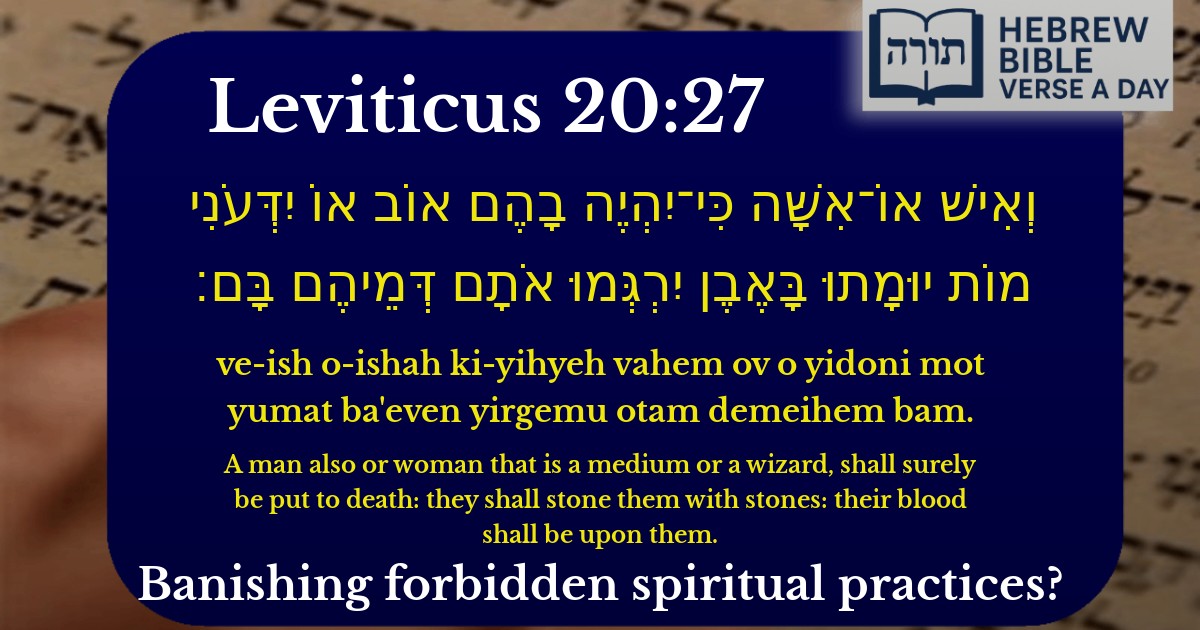Join Our Newsletter To Be Informed When New Videos Are Posted
Join the thousands of fellow Studends who rely on our videos to learn how to read the bible in Hebrew for free!
Hebrew Text
וְאִישׁ אוֹ־אִשָּׁה כִּי־יִהְיֶה בָהֶם אוֹב אוֹ יִדְּעֹנִי מוֹת יוּמָתוּ בָּאֶבֶן יִרְגְּמוּ אֹתָם דְּמֵיהֶם בָּם׃
English Translation
A man also or woman that is a medium or a wizard, shall surely be put to death: they shall stone them with stones: their blood shall be upon them.
Transliteration
Ve-ish o-ishah ki-yihyeh vahem ov o yidoni mot yumat ba'even yirgemu otam demeihem bam.
Hebrew Leining Text
וְאִ֣ישׁ אֽוֹ־אִשָּׁ֗ה כִּי־יִהְיֶ֨ה בָהֶ֥ם א֛וֹב א֥וֹ יִדְּעֹנִ֖י מ֣וֹת יוּמָ֑תוּ בָּאֶ֛בֶן יִרְגְּמ֥וּ אֹתָ֖ם דְּמֵיהֶ֥ם בָּֽם׃ <span class="mam-spi-pe">{פ}</span><br>
וְאִ֣ישׁ אֽוֹ־אִשָּׁ֗ה כִּי־יִהְיֶ֨ה בָהֶ֥ם א֛וֹב א֥וֹ יִדְּעֹנִ֖י מ֣וֹת יוּמָ֑תוּ בָּאֶ֛בֶן יִרְגְּמ֥וּ אֹתָ֖ם דְּמֵיהֶ֥ם בָּֽם׃ {פ}
🎵 Listen to leining
Parasha Commentary
📚 Talmud Citations
This verse is quoted in the Talmud.
📖 Sanhedrin 67a
The verse is discussed in the context of the laws regarding sorcery and witchcraft, particularly the punishment for those who practice these forbidden acts.
📖 Sanhedrin 65b
The verse is referenced in a discussion about the definitions and implications of being a 'medium' or 'wizard' and the severity of their punishment.


Prohibition of Necromancy and Sorcery
The verse (Vayikra 20:27) prohibits the practices of ov (necromancy) and yidoni</em (sorcery), prescribing the death penalty by stoning for those who engage in them. Rashi explains that ov refers to a medium who conjures the dead through specific rituals, while yidoni involves a sorcerer who uses a bone from the yadoa (a certain creature) to perform divination. These practices are severe violations of Torah law, as they seek supernatural knowledge outside of Divine channels.
Severity of the Transgression
Rambam (Hilchot Avodah Zarah 11:16) emphasizes that these acts undermine the foundations of Torah belief, as they attribute power to forces other than Hashem. The Talmud (Sanhedrin 65a) elaborates that these practitioners attempt to manipulate spiritual forces, which is tantamount to idolatry. The punishment of stoning reflects the gravity of the sin, as it is reserved for the most severe offenses against the sanctity of Jewish law.
Blood Guilt and Moral Responsibility
The phrase "דְּמֵיהֶם בָּם" ("their blood shall be upon them") teaches that those who engage in these practices bear full responsibility for their fate. The Sforno comments that they bring death upon themselves by rejecting Divine authority and pursuing forbidden knowledge. The Midrash (Sifra Kedoshim 9:12) further states that such individuals forfeit their right to life by corrupting the spiritual order.
Contemporary Relevance
While the judicial system for capital punishment is not operative today, the prohibition remains binding. The Chafetz Chaim (in Ahavat Chesed) warns that dabbling in occult practices weakens emunah (faith) and distances a person from Torah values. Orthodox halacha maintains that all forms of witchcraft, fortune-telling, and necromancy are strictly forbidden, as they contradict the principle of "תָּמִים תִּהְיֶה עִם ה' אֱלֹקֶיךָ" ("You shall be whole with Hashem your G-d" – Devarim 18:13).